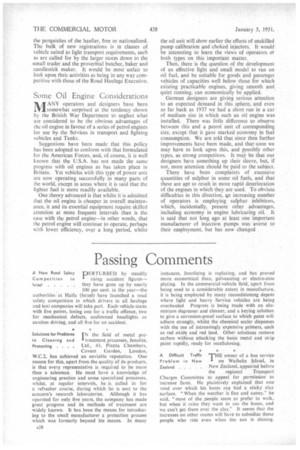Some Oil Engine Considerations M ANY operators and desi g ners have been
Page 30

If you've noticed an error in this article please click here to report it so we can fix it.
somewhat surprised at the tendency shown by the British War Department to neglect what are considered to be the obvious advantages of the oil engine in favour of a series of petrol engines for use by the Services in transport and fighting vehicles and Tanks. Suggestions have been made that this policy has been adopted to conform with that formulated for the American Forces, and, of course, it is well known that the U.S.A. has not made the same progress with oil engines as has taken place in Britain. Yet vehicles with this type of power unit are now operating successfully in many parts of the world, except in areas where it is said that the lighter fuel is more readily available. One theory advanced is that whilst it is admitted that the oil engine is cheaper in overall maintenance, it and its essential equipment require skilled attention at more frequent intervals than is the case with the petrol engine—in other words, that the petrol engine will continue to operate, perhaps with lower efficiency, over a long period, whilst the oil unit will show earlier the effects of unskilled pump calibration and choked injectors. It would be interesting to learn the views of operators ol both types on this important matter. Then, there is the question of the development of an effective light and small model to run on oil fuel, and be suitable for goods and passenger vehicles of capacities well below those for which existing practicable engines, giving smooth and quiet running, can economically be applied. German designers are giving serious attention to an expected demand in this sphere, and even as far back as 1937 we had a short run in a car of medium size in which such an oil engine was installed. There was little difference to observe between this and a petrol unit of corresponding size, except that it gave marked economy in fuel consumption. We are told that since then further improvements have been made, and that-soon we may have to look upon this, and possibly other types, as strong competitors. It may be that our designers have something up their sleeve, but, if not, more attention should be paid to the subject. There have been complaints of excessive quantities of sulphur in some oil fuels, and that these are apt to result in more rapid deterioration of the engines in which they are used. To obviate difficulties in this direction, to increasing number of operators is employing sulphur inhibitors, which, incidentally, present other advantages, including economy in engine lubricating oil. It is said that not long ago at least one important manufacturer of injection pumps was averse to their employment, but has now changed




















































































